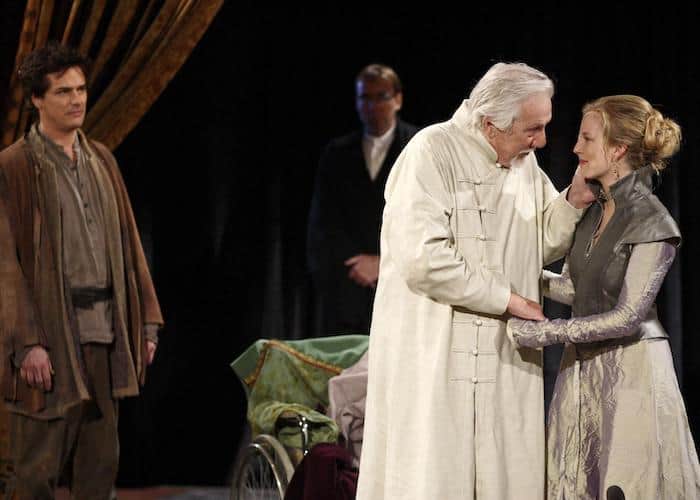
Canadian television doesn’t get much credit outside Canada. Hell, it doesn’t get much credit inside Canada, either. As an industry, filmmakers have a very specific mandate to produce original content that front-faces Canadian artists and creators over those from our neighbors to the south or overseas. This is largely a good thing, but for many years, what we call CanCon resulted in a lot of bland and monotonous TV that looked and sounded remarkably similar (think the BBC in the ’70s) and brought little interest from those watching at home or abroad. However, with the recent crossover hit of Schitt’s Creek, as well as other Canadian content available via Netflix, the prospects of Canadian TV look better than ever; which means it’s time to revisit one of Canada’s best shows of the last two decades and its stellar conclusion.
Slings And Arrows began airing in 2003 on what was then The Movie Network, now CraveTV. The show depicts The New Burbage Festival, a lightly fictionalized version of the Stratford Shakespeare Festival that has been running in Stratford, Ontario, since 1953 and is considered by most in the theatre community to be at the forefront of large-scale Shakespearean-focused theatre companies. Co-created by writer/actor Bob Martin, Kids In The Hall alum Mark McKinney, and playwright and Soulpepper Theatre co-founder Susan Coyne, all of whom also appear as members of the cast, Slings And Arrows bucks the tradition of Canadians doing straight comedy by leaning equally on drama, using the Shakespeare productions it depicts as a foil to examine the interpersonal relationships of artists struggling against commerce.
The show’s characters mirror counterparts in the Bard’s canon. The “antic disposition” of disgraced former actor Geoffrey Tennant (Paul Gross) directing Hamlet, a play he famously suffered a nervous breakdown performing, while trying to prevent another mental collapse in the first season. The haunted and guilt-ridden Ellen Fanshaw (Martha Burns), wondering if her and Geoffrey’s newly requited relationship can survive his hallucinations, playing Lady Macbeth in the second season. The sooth-saying but often ridiculous ghost of former artistic director Oliver Welles (Steven Ouimette), lurking throughout the entire series just as the fools and ghosts of Shakespeare lurk throughout his Folio.
Over three seasons depicting three major Shakespeare productions (Hamlet, Macbeth, and King Lear), Slings and Arrows manages to show the inherent drama of artists struggling against the confines of capitalism. Believing that they can make good art that is also profitable, the characters wage a fight every artist can relate to. And culminating with the series finale, it concedes to the realities of capitalism. In other words, no matter how good your art is, if it doesn’t make anyone any money, it doesn’t have a right to exist.
In the third season, Gross’s Geoffrey Tenant sets out to direct a production of King Lear starring Charles Kingman (the dazzling stage and screen legend William Hutt in his last major role), an aging stage actor hiding a terminal cancer diagnosis and a secret heroin dependence. When Tennant finds out, Charles begs Geoffrey not to tell anyone about his diagnosis, making him promise to let him play Lear before he dies. Meanwhile, Richard Smith-Jones (McKinney), the success-obsessed General Manager of the festival, slowly pushes the production of Lear further into the margins as problems from its lead arise, favoring East Hastings, the Rent-like musical he’s producing with director Darren Nichols (an absolutely brilliant Don McKellar, skewering every pretentious windbag that has ever lived). As the lies start unraveling after more and more delays to Lear, Richard fires Geoffrey and cancels the production, at the same time elevating his musical to main-stage status and massive financial success, plotting with the newly ambitious Darren to take over both the financial and artistic side of the festival.
After Charles is finally hospitalized, and Ellen has left the production and Geoffrey to take a well-paying but embarrassing TV gig, the rest of the cast is scattered and demoralized. The production seems destined to never see the light of day, but sticking to the promise he made Charles, Geoffrey assembles his cast, utilizing a church’s multi-purpose room, and mounts a one-night-only engagement of King Lear. He even takes on the role of Kent himself as his first appearance on stage since the disastrous performance of Hamlet that caused his mental breakdown and exit from the company so many years earlier. They successfully perform King Lear, giving Charles Kingman his dying wish to finally stage the finale of his career and life.
And that’s it. One night, one audience, one performance. The main-stage show is still canceled. Geoffrey is still fired. Ellen, who broke her contract with the TV show to make the one-off performance, gets sued by the producers of the show, and Ellen and Geoffrey let the bank take their house to pay for the damages. They plan a move to Montreal to start a new theatre company and a new life. The ghost of Oliver fades out of view, having paid his penance on earth by helping Charles across the veil. The festival goes on with Richard and Darren in charge, heading off in a sequinned, populist direction where musicals based on movies will be the major draw. They proved that great art, and especially great theatre, is nebulous. Ethereal. Impermanent. A single great performance by a single great company means nothing outside the audience that witnesses it, the actors who created it, and the technicians who built it. No more, no less.
The lumbering bulldozer of capitalism will lurch onwards, dragging with it any profitable entities it can use to feed its furnace, while art for art’s sake withers and dies on the fringes. Pessimistic? Perhaps. But as predictions go, it’s a fairly safe bet. The fools and ghosts of Shakespeare’s plays were often terrifying, or confounding, or even infuriating, but in the end, they always spoke the truth.
Related Topics: Canada, Canadian, Mark McKinney, Paul Gross, Shakespeare, Slings And Arrows, Stratford Festival

